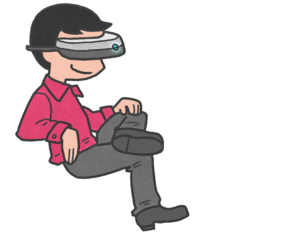In July this year, in an earnings call, Mark Zuckerberg used the word- Metaverse 20 times. He wants to shift the gear of the company from a social media platform to a metaverse company. The company wants to leap by focusing on VR headsets, superseding the VR experience provided by smartphones.
One can think it to be either the next big revolution in the world of the internet or some trendy corporate buzzword to entice investors over some vague idea that may not take place soon. Either way, tech companies like Facebook are creating a space for the acceptance and excitement about “Metaverse” amongst the users.
For many people, Metaverse is a new concept. But that’s exactly not the case! If you have seen the movie ‘Ready Player One’ then you might be aware of what the concept of metaverse says. A Strap on a pair of computerized glasses that transports you to the unimaginative digital universe full of adventure. In Hollywood Sci-Fi movies, the phenomenon of ‘beyond reality’ always existed. The popular Sci-Fi Fiction “The Matrix” may also give you a glimpse of the future having the metaverse as one of the variables.
What Is MetaVerse?
The Metaverse can be broken down into two words- Meta, which means beyond and Verse can be called universe. Here, the user experiences the world beyond reality driven by Virtual Reality and Augmented Reality. A user feels physical, mentally, and emotionally involved. Such activity and interaction are increasingly anchored by infrastructures like the digital economy, digital identities and decentralised forms of organisation.
 To elaborate it further in a simple language, one can take the example of a popular game- Pokémon GO. Here, the user can feel that the pokemons are there for real! The spatial and time distance almost erases in this illusionary world. It is supported by Augmented reality (AR) which gives an interactive experience of a real-world environment to the user, where the objects found in the real world are amplified by computer-generated perceptual information, sometimes across multiple sensory modalities, including visual, auditory, and olfactory. Another example can be the popular image clicking app, Snapchat.
To elaborate it further in a simple language, one can take the example of a popular game- Pokémon GO. Here, the user can feel that the pokemons are there for real! The spatial and time distance almost erases in this illusionary world. It is supported by Augmented reality (AR) which gives an interactive experience of a real-world environment to the user, where the objects found in the real world are amplified by computer-generated perceptual information, sometimes across multiple sensory modalities, including visual, auditory, and olfactory. Another example can be the popular image clicking app, Snapchat.
The term “Metaverse” is not new, It was first mentioned in Neal Stephenson’s 1992 cyberpunk story “Snow Crash.” Older stories also recognized the same technology but called it cyberspace. It was first found in William Gibson’s 1982 story “Burning Chrome.” Then, after two years, he discussed it again in his 1984 novel “Neuromancer.”
The space of metaverse employs NFTs ( Non-Fungible Tokens)– a digital asset, representing real-world objects like art, music, in-game items and videos. They can be traded online by simply exchanging cryptocurrency against the digital asset and are encoded with the same underlying software as many cryptos.
If you are aware of Minecraft, Roblox and Fortnite, then you must know how these platforms work. For instance, on an online gaming platform Roblox, a Gucci Dionysus bag was recently sold at 350,000 Robux, approximating to $4,115. Gucci’s presence on Roblox shows the potential of money making on the gaming platform which was initially popular among children and is rapidly becoming a prominent metaverse platform for all.
Sketch Of Facebook Plan On Metaverse:
Facebook Plans To Transcend Smartphones:
 Facebook in its earnings conference, in July, mentioned that it will line up hardware, but that’s not where the real money will inflow. Zuckerberg said Facebook’s goal is to make available its headsets supporting Virtual Reality at cheaper rates and focus on generating revenues through commerce and advertising within the metaverse itself.
Facebook in its earnings conference, in July, mentioned that it will line up hardware, but that’s not where the real money will inflow. Zuckerberg said Facebook’s goal is to make available its headsets supporting Virtual Reality at cheaper rates and focus on generating revenues through commerce and advertising within the metaverse itself.
“Our business model isn’t going to primarily be around trying to sell devices at a large premium or anything like that because our mission is around serving as many people as possible,” Zuckerberg said on the earnings call.
He added, “So we want to make everything that we do as affordable as possible, so as many people as possible can get into it and then compound the size of the digital economy inside it.”
Facebook already operates the brand Oculus, the virtual reality ( VR) division of Zuckerberg’s company. To pursue the ambitious dream, the tech company started to spread its wings when it acquired Oculus for US$2.3 billion in cash and stock. By September 2018, Oculus became a separate division within the newly structured Facebook known as Facebook Technologies, LLC and in August 2020 Oculus Connect was branded as “Facebook Connect” and Facebook’s VR and AR team became “Facebook Reality Labs”.
In October 2020, it revealed Oculus Quest 2. At present, Oculus VR is limited in its functioning and lacks aesthetic appeal. But, Facebook is striving to upgrade, innovate and improve the technology so that their VR headsets look more like trendy Finlay & Co Sunglasses rather than a clunky helmet.
To make the metaverse work, one needs to work on providing suitable hardware that makes a user feel a sense of presence in the digital world, and that’s where Zukerberg is also focusing, not forgetting the pricing factor.
August 2021: FB Launched VR Remote Work App
Facebook Inc launched a virtual reality remote work app wherein a video of the employees of the workers are shown using Oculus Quest 2 headsets that enable them to hold meetings as avatar versions of themselves.
It abandons the old style of doing video conferencing using a webcam. Horizons Workrooms use VR headsets (say, Facebook’s Oculus Quest 2) to conduct a meeting in a VR space. Facebook is introducing Horizon Workrooms as a new way to interact with employees in virtual reality. Workers can create cartoon avatars of theirs and communicate with their colleagues in virtual meetings. It gets more interesting and weirder, as it catches the computer screen into a VR experience.
Although it can not be exactly termed as Metaverse, it is certainly opening up the horizon to Metaverse.
Facebook has brought the VR-Meeting experience at a time where many companies are continuing with WFM. In zoom meetups or Google meet calls, people had the option to switch off their cameras and still be present in the conference, but with Horizon you can interact, present PowerPoint slides and engage with your colleagues’ virtual avatars. In simple words, it has taken a room conference experience to a virtual world with virtual avatars of people.
Sale Of Virtual Goods Over Advertisement
 Advertisement will play “an important part” in Facebook’s strategy to extract profits from the metaverse, but its emphasis would remain on commerce in the digital world.
Advertisement will play “an important part” in Facebook’s strategy to extract profits from the metaverse, but its emphasis would remain on commerce in the digital world.
Similarly to what was stated above, video games like Microsoft’s Minecraft, Roblox and Fortnite are called the early versions of the metaverse. Players purchase these video games platforms. Zuckerberg gave a clue of how Facebook strategises its money-making in its metaverse, taking a chunk of every transaction.
“I think digital goods and creators are just going to be huge… in terms of people expressing themselves through their avatars, through digital clothing, through digital goods, the apps that they have, that they bring with them from place to place,” Zuckerberg said.
“A lot of the metaverse experience is going to be around being able to teleport from one experience to another. So being able to have your digital goods and your inventory and bring them from place to place, that’s going to be a big investment that people make.”
Metaverse: Guiding Force Of The Future
Metaverse will be a driving force, if executed properly, on how the marketing teams will lead the campaigns. They will have to think in lines of VR, AR and 3-D figures. Even for the smallest of the shops, to exist in the competition, the marketer will have to compulsorily give their customers a virtual tour of their products. The preferences and tastes of the customers will be totally dependent on how things appeal to them in the virtual world.
Hackl says that:
“Brands will need to rethink their narratives in three dimensions and that marketers will need to embrace emerging technology at a faster speed. In the metaverse, everyone is a world builder, including brands.”
In addition, the metaverse world will change the dynamics and working of social media, just like social media changed the traditional way of marketing.
 Facebook and Instagram, perhaps, make a switch from smartphones to headsets, but who knows how that will be executed! It will need to be customised hardware, and hitherto, Oculus is not prepared to give a lifetime experience of the VR world. There are many hardware constraints to consider. Not only are Oculus headsets bulky, but they aren’t yet suitable for the metaverse.
Facebook and Instagram, perhaps, make a switch from smartphones to headsets, but who knows how that will be executed! It will need to be customised hardware, and hitherto, Oculus is not prepared to give a lifetime experience of the VR world. There are many hardware constraints to consider. Not only are Oculus headsets bulky, but they aren’t yet suitable for the metaverse.
But, on the other hand, if we see, Tech companies are going gaga over futuristic concepts that are half baked yet, like artificial intelligence. It is to be noted that still Real AI does not exist in a complete sense and the terms of Virtual Reality, Artificial Intelligence, Augment Reality and many such terms get blurred and pop into the same basket.
There’s a good chance that the metaverse notion will fall into the same pit. More businesses, particularly Facebook and Microsoft, hype up their near-term metaverse initiatives, forgetting that we are still years away from turning it into reality. But, it can’t be denied either that there is a possibility that metaverse turns into reality.

